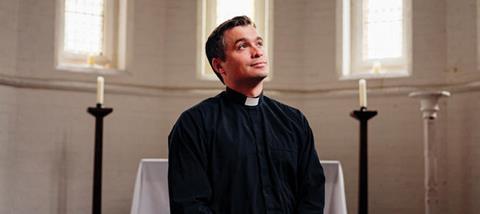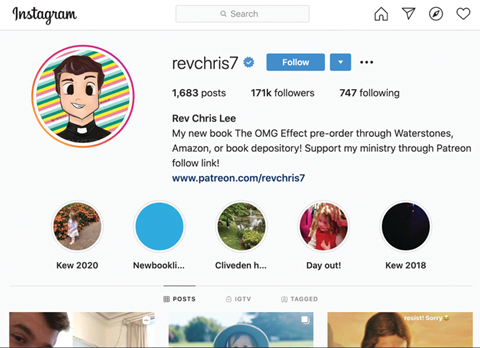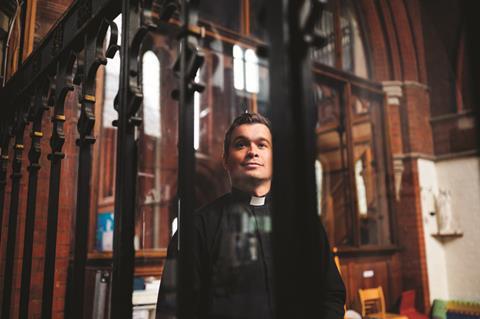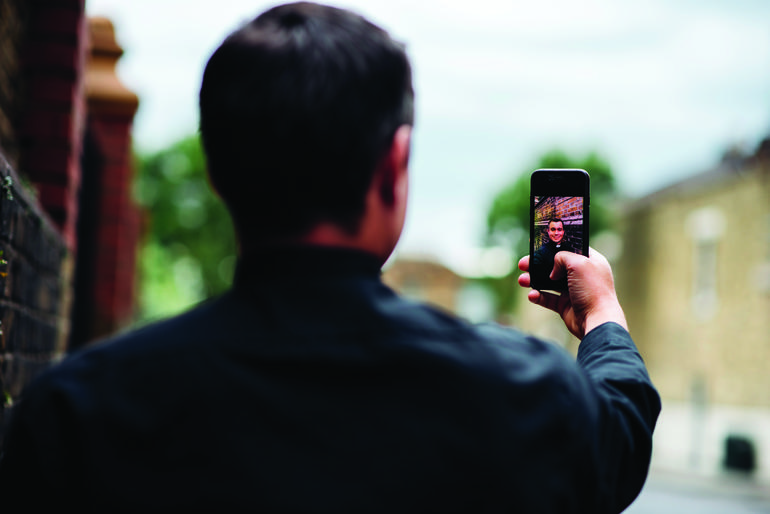He has more followers than the Archbishop of Canterbury and tens of thousands watch his 60-second sermons. BBC News has dubbed him “an internet sensation”, but what message is Rev Chris Lee seeking to communicate?

The Rev Chris Lee’s daughter woke up at 4:45am this morning. By 6:30am the bleary-eyed vicar was pushing her around the family’s local west London park. I know this because I’m one of the 170,000 people who follow the clergyman on Instagram (@revchris7). Not only do I gain a glimpse into Chris’ family life, but I’m treated to 60-second sermons, Inspirational quotes and Bible verses. Chris’ good looks (he’s been dubbed “the hot priest”), along with his good humour, has helped him build a gigantic audience, and reach thousands of people who wouldn’t dream of setting foot inside a church building.
When I ask Chris what the key is to developing such a large following on Instagram (more than the CofE and Archbishop of Canterbury accounts combined), his answer is instant: authenticity. He receives private messages every day from those who don’t share his faith. These include: “I’m an atheist, but I’d have a pint with you”, “I’m not spiritual or anything, but I love your sermons” and even: “You are the only Christian I can stand, tbh [to be honest].”
This Morning presenter Holly Willoughby’s statement that Chris is “the nation’s favourite vicar” is a curious one. Most Christians have certainly never heard of him, proving it’s possible to be a household name within one corner of the internet, but remain unheard of outside of it. The majority of his audience appear to be unchurched – a fact that clearly excites Chris. His evangelistic outlook also means he doesn’t seem too bothered when I point out that the title of his forthcoming book, The OMG Effect (Century), might be controversial among believers.
Although he was raised in a Christian family, Chris drifted from church in his teenage years. His thriving business career meant he was earning good money (he had a mortgage by the time he was 20). But none of it satisfied him. Then a mission trip to Tanzania changed everything. “My faith really hit the accelerator, and in that period of time I was quite quickly thinking: I’m called to be a priest.” Of course, he never guessed that following a vocation in the Church of England would lead to celebrity status. Or that an invitation to taste Korean chicken would catapult him to internet stardom (more on that later).
During our hour-long Zoom conversation, the vicar of St Saviour’s and founder of Young Franciscans tells me the CofE has been “slapped in the face” by Covid-19. It has forced the hierarchy to “wake up” to online church, and the opportunities digital affords us. The future is hybrid, he continues: both physical and digital services will be vital. And as for 40-minute sermons? They won’t last.
The admission that his online posts tend to take the form of “Christian self-help” might raise some eyebrows, but figuring out how to preach the gospel on a platform like Instagram can’t be easy. The fact that he’s engaging a generation that his denomination has largely failed to reach should not be overlooked. If it wants to have any hope of reaching millennials and Gen-Zrs online, the Church of England could do with raising up at least another 50 Chris Lees.
How did you become a Christian?
Like many people, I went to church as a child and then drifted in my teenage years. I made a group of friends at university who weren’t nasty or anything, but the environment was quite negative. My life back then was much more hedonistic and superficial. It left me feeling rather shallow and lacking, and I just didn’t know who I was or what I wanted. Even though at 20 I had a house, a mortgage and a career path in front of me, I just knew in my heart that it wasn’t the answer. So I quit my job, put my house up to let and bought a ticket to Tanzania, where a really good friend of mine was working as a missionary. That changed my life. I didn’t realise how hungry I was for faith until I got out there.
I was teaching English in Tanzania. Everyone owned a Bible and one side was Swahili and the other side was English. So it was really easy to teach by reading the Bible, because if they found words difficult, they could just look at the Swahili version. I gorged on the Bible and fell in love with the person of Jesus. At the weekends, we were doing these things called confirmation safaris, where the bishop would preach and baptise and confirm hundreds of people. I was seeing faith and hope in a real form that I’d never seen before. I just woke up to the fact that this is what I’d been looking for.
You were ordained deacon in the Diocese of Mount Kilimanjaro. What brought you back to the UK?
My parents were still funding me. I’d left this degree in business and this job and moved to Africa. My parents were like: “What are you doing? We can’t just sustain you for the rest of your life.” And I thought: “Yeah, you’re right.”
You ended up studying at Ridley Hall in Cambridge. Which part of the Church of England do you feel most comfortable in, theologically speaking?
I feel like I’m a bit of a mongrel when it comes to my kind of churchmanship. I just gravitate to wherever I see life; wherever I see Christ. But if you want to put me in a box I would say I’m an open evangelical charismatic with a Catholic sacramental understanding. So basically, I’m keeping it broad! I love sacred space, I trust the Bible and believe in the work of the Spirit.

How did you end up with such a large social media following?
My brother-in-law, Ollie, was working on a YouTube channel with his friend where they introduced their friends to Korean culture, music and food. I went on and ended up being quite popular. The stereotype of a priest is: old, a bit detached, maybe quite judgemental, aloof, holier-than-thou. And here I am – a young guy who’s at least trying to come across as non-judgemental. I was able to articulate myself relatively well and started to get a little bit of a following. Then I prayed during one of the episodes and that really hit a note with a lot of people, and suddenly my Instagram started filling up with all these people who had seen me on YouTube.
Then the guys started a series called ‘A British priest reacts to...’We just released an episode yesterday where I react to a K-pop band called Black Pink. And I suddenly realised: oh my gosh, I am reaching literally millions of young people. I’m speaking about God and bringing in parables and stories of Jesus to help people understand the cultural references that I’m seeing in music videos! It was amazing – but also daunting. I’ve had 350 million views on the videos that I’ve been in. It has become a huge part of my ministry.
So this is something you’ve just fallen into – you didn’t seek it out?
This all began because I was asked: “Hey, Chris, can you try this Korean chicken and talk about it?” So I tried the chicken and talked about it, and now I find myself with hundreds of thousands of people following me!
What motivates you to do this kind of ministry?
Young people’s information, their entertainment, their social interactions are as much online now as they are in person, and so as the Church we need to be asking ourselves: “How do we invade that space with the gospel?"
When I was praying: “Lord, what are you doing with me?” I read Acts and this scripture hit me in the face. Paul goes to Athens and he talks to the people about the unknown God that they’re worshiping [Acts 17:19-34]. And it says he went to the place where all the nations gathered and talked about the latest ideas, but they did nothing. I thought: Wow – that is social media. It’s a place where the nations gather. It’s where they share and talk about the latest ideas. And they don’t necessarily do anything about it. And I felt the Lord say: “I want you to stand in this area and I want you to tell them about the unknown God in this space.” And that’s what I’ve been doing. I’ve just been preaching light, love, hope and Christ into that space and telling a generation of young people, who often are plagued by insecurity and identity issues, that they’re precious, that they’re loved, that they are image-bearers of the most high God, and that they are not alone.
What have you learned about the kinds of content that work well on social media?
Young people nowadays are hungry for authenticity. It doesn’t need to be pre-packaged or beautifully edited together. My Instagram is not cut-and-paste church. It’s a lot more accessible to the non-churched because it looks and feels like the culture that I’m speaking to. It’s just some guy talking into his phone, and he happens to be talking about faith.

Some of your 60-second sermons are being compiled into a book. It’s entitled The OMG Effect (due out in November). Isn’t that a controversial title?
I think the title is great because I’m speaking into a culture that uses this language and I’m trying to reclaim it. Everyone uses ‘OMG’ [oh my God] all the time. And I want to be like: “OK, let me speak about this unknown God that you keep talking about.”
Are you walking a tightrope when it comes to wanting to be positive online, but also wanting to share a gospel that involves calling people to repentance?
I can’t properly disciple millions of people. What I can do is get them on the path towards discipleship, by teaching them first and foremost that God is for them, that he loves them, that he’s not an enemy who sits aloof and judges them, that he is a loving Father who seeks to embrace them.
I touch on the fact that we are sinful and that we need Jesus and I've talked about repentance, don’t get me wrong, but I think people need to know the first foundational truth –that we are image-bearers and that we are loved.
I’m hoping that people move forward into churches. If I started coming online and crashing down on this sin and that sin, it could be seen as quite judgemental and turn people off, and then I’ve lost any chance of getting them into churches.
Anyone who does this broad kind of ministry can come under criticism, and some of it is probably fair, and I need to hear it, and I need to wrestle with it in my own conscience. It’s not easy, but I will stand before the Lord and happily give my account.
What have been the upsides and downsides of having such a huge following?
There is hilarity to being stopped and asked for selfies and autograph sand things like that. So that’s a fun part of it.
I’ve had some other people sexualise me in different ways and talk about how naughty I am or whatever – weird things.
You do get some negativity, obviously. But if I didn’t get any negativity I’d probably be a little bit worried!
Where does the negativity come from– is it fellow Christians?
Some Christians, but I’m actually really excited by the body of Christ that I’ve seen online. A few people have arguments on my comments with other people, but there’s a general principle that you don’t feed the haters, so I’m not going to get into theological discussions in the comments.
The thing that really hurt me was when our church service on Zoom was hacked and someone put explicit images up. At the time I was calm and dealt with it quickly, but after the service I felt really affected, because it felt as if a wolf had jumped into my sheep fold and run a little bit amuck. It actually hurt me more than I thought it would.
Do you talk about St Saviour’s much on your Instagram feed?
No, I don’t promote my church online because I don’t want to suddenly have 1,000 people turn up. It would swell us and we would get a lot more people coming, but it wouldn’t necessarily be the right way to build our community. We have grown and we do still get fans coming, and I just say: “You’re welcome, but please don’t ask people for photos in here.” There are other people in my church who are famous– we have to protect them too.
Some Christians are concerned about what social media is doing to us. They advocate for technology Sabbaths where you switch off your phone for 24 hours. Do you agree with that approach?
I think it’s the old Greek thing of “everything in moderation, nothing in excess”. If I wasn’t on social media, I could be binge-watching the news, or Netflix, or making an idol out of my body and hitting the gym every day. Let’s not just make one thing the enemy. The enemy can use anything to get in.
I promote stillness. I promote contemplation. I practise centering prayer. We need to have an outlook that says: “How do I look holistically at my life and live in a more contemplative way?” That means putting into practice good models of living – getting your five minutes of silence in the day when you can; having some kind of structure. I’ve got a rule of life that I try to live by. My priority is still communion with the Lord, and that comes through prayer, worship and scripture. Endless scrolling will fill your life if you’re not careful.
To hear the full interview download The Profile podcast







































No comments yet